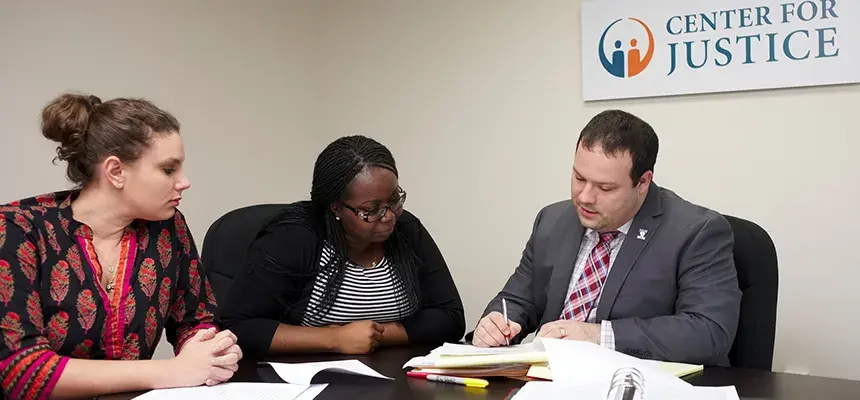
Pro Bono Experiential Learning Requirement
RWU Law’s Pro Bono Experiential Learning Requirement is designed to instill in law students the value and habit of providing pro bono legal service to low-income communities and increasing access to justice, while at the same time providing an opportunity for students to gain valuable practical legal experience.
Requirement
The Pro Bono Experiential Learning Requirement (Pro Bono ELR) requires every student to undertake 50 hours of law-related pro bono legal work, as defined by ABA Model Rule 6.1, in order to graduate. Law students may not receive compensation or academic credit for their qualifying service and placements must be approved.
“Every lawyer, regardless of professional prominence or professional workload, has a responsibility to provide legal services to those unable to pay, and personal involvement in the problems of the disadvantaged can be one of the most rewarding experiences in the life of a lawyer.” - Model Rule 6.1 of Professional Conduct, American Bar Association, Comment #1
Three Ways to Satisfy the Pro Bono ELR
Unpaid Internships with Public Interest Organizations, Government Agencies, and Judges/Courts
There are many public interest legal organizations (e.g., legal aid offices, public defenders, prosecution offices), government agencies, and judges, in Rhode Island and around the country, doing amazing work, where you can intern and accrue pro bono hours. You can also work with a private attorney who is doing pro bono or working on a court-appointed criminal matter, and this also counts as our pro bono for the 50-hour graduation requirement. All you need to do is request pre-approval through our Etrieve system.
Pro Bono Collaborative Project
The Pro Bono Collaborative ("PBC") develops and facilitates pro bono legal service projects that match RWU Law students with Rhode Island’s top law firms and attorneys to provide pro bono legal assistance to community-based organizations and their constituents. Students are screened by the Feinstein Center but may be supervised by Pro Bono Collaborative partnering law firm attorneys. If selected, students are asked to commit to two semesters and can expect to work on their project between 4-15 hours per month. We recruit for Pro Bono Collaborative projects each August and email opportunities to join projects periodically throughout the year.
Alternative Spring Break
We offer a robust Alternative Spring Break Program ("ASB") where students spend a week engaged in full-time pro bono legal service with their peers.
Certifying Your Pro Bono Hours
To receive credit for completion of the 50-Hour Pro Bono Experiential Learning Requirement, students must complete all required forms and submit them through the Etrieve system to the Feinstein Center by the required deadlines. Forms must be completed for each pro bono placement or project that the student intends to use towards their 50-hour requirement.
See all Pro Bono ELR Forms here
“A lot of students say that doing their pro bono service has altered the course of their professional aspirations. We’ve had students say that their experience was the defining moment of their law school journey. It’s been very powerful.”
- Eliza Vorenberg, Director of Pro Bono & Community Partnerships
The following graduating students completed one hundred hours or more of pro bono legal service:
Amy T. Anthony
Jackson Asanza
Cindy J. Balog-Chavez
Sydney Agnes Marran Barletta
Amy L. Bath
Ryan J. Becker
Isaac Lee Berlau
Aidan Boisvert
Christina Brilhante
Erica Grace Calderin
Daniel Richard Calise
Vito J. Capuano
Jordan Daniel Carvalho
Louise Andonate Cestone
Kailey Chalmers
Lindsay Jean Cheshire
Giacomo D'Alessandro
Natalie Esther DeAngelis
Amy M. Domenack
Keishia Dormena
Megan Beatríz Dosouto
Andrew W. Dunphy
R. Arielle Epstein
Anna Erin Fennell
Samuel Ramick Filiaggi
Destiney Ann Flores
Julianna Lynn Fonseca
Joseph Robert Forcino
Gina Celeste George
Megan Lyn Graham
Ashaki James
Shanel Jenea James
Susannah Reed Johnson
Layla Ashley Kassem
Julia Rose Keefe
Patrick Joseph Keenan
Maddison R. Leite
Austin Robert Lentz
Kaiya Betony Letherer
Lia Dione Lewis
Samantha A. Lobato
Spencer MacDonald
Theodore Maxwell Montalbano
Grant Enok Mooney
Gabriel Antonio Moreno
Ashley Nicole Nicholson
Jacqueline Ricarda Paniagua
Shenita Jenee Perry
Michael J. Pluhowski
Brandon Potter
Sara Jane Pruell
Jeffrey Thomas Puschak
Kyle Bytof Renner
Samantha Kay Rhodes
Rafael Antonio Rodriguez
Riley J. Runk
Leticia G. Salgado
Maggie Lynn Burch Shumar
Nicole Anne Smith
Jonathan Malik Tonico
Nikola J. Trahan
Nathaniel Trinidad Agraan Miyamoto Posthumous
Makaylah C. Vega
Myrta Lucia Ventura
Dietrich Henry Vogel
Lia Marie Williams
Michael Zhang
Nora Elizabeth Zientak
